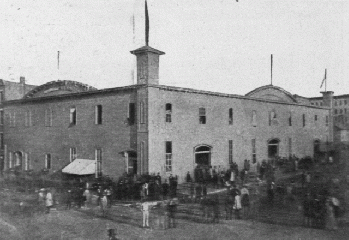
Chicago Wigwam (site of 1860 Republican National Convention)
(Image by (From Wikimedia) Alexander Hessler, Author: Alexander Hessler) Details Source DMCA
The last time a major American political party fell completely apart, it did so over the expansion of slavery. The split between the Whig Party's northern and southern factions resulted in the party's dissolution, the ascendance of the Republican Party (the first Republican president, Abraham Lincoln, was a former Whig), and the Civil War. Between 1854 and 1856 the Whigs faded from the second largest party in Congress to non-existence.
The last time a major American party came anywhere close to falling completely apart, the divisive issue was racial segregation. Several southern state Democratic Parties split off to form the States' Rights Democratic Party (the "Dixiecrats"), running Strom Thurmond instead of Harry Truman in the 1948 presidential election, carrying four states and racking up 39 electoral votes. Truman won anyway.
The Dixiecrats were more or less an historical footnote by 1952, although a "National States' Rights Party" persisted for awhile. Alabama governor George Wallace appealed to the same constituency in his independent presidential campaigns, and 2008 Libertarian Party presidential nominee Bob Barr tried to dog-whistle up a Dixiecrat resurgence.
Next week's Republican National Convention in Cleveland may be ground zero for America's next great partisan implosion. The issues involved are both more numerous and more nebulous -- foreign policy, immigration policy, trade policy, gun policy, tax policy, what have you -- than in similar previous episodes.
In the past a few of those internal policy disputes could be kicked down the road every four years for the sake of party unity and political victory. This year something's changed. The rise of Donald Trump has brought all of them to a single head in one moment. In addition, the man himself scares the bejabbers out of the party establishment with his garish, faux-populist, medicine show style.
For that establishment, the closest thing possible to victory is for Trump to lose, either to revolting delegates in Cleveland or to Hillary Clinton in November. The party can't win the White House with Trump, then go back to being the party of George W. Bush, let alone Ronald Reagan. If Trump wins, the establishment loses and the GOP becomes, more overtly than ever and probably irreversibly, the party of banana republic nationalism.
For Trump's supporters, victory looks like " well, like winning with Trump and making the GOP, more overtly than ever and probably irreversibly, the party of banana republic nationalism.
That signpost reads "all downhill from here."
In this election, the functional equivalent of the 1948 Dixiecrat ticket are the Libertarian Party's nominees, two "moderate Republicans" who will be on the ballot in at least 40-odd states rather than four. But where the Dixiecrats were a menace to the Democratic establishment, Gary Johnson and William Weld may be the Republican establishment's only hope.




